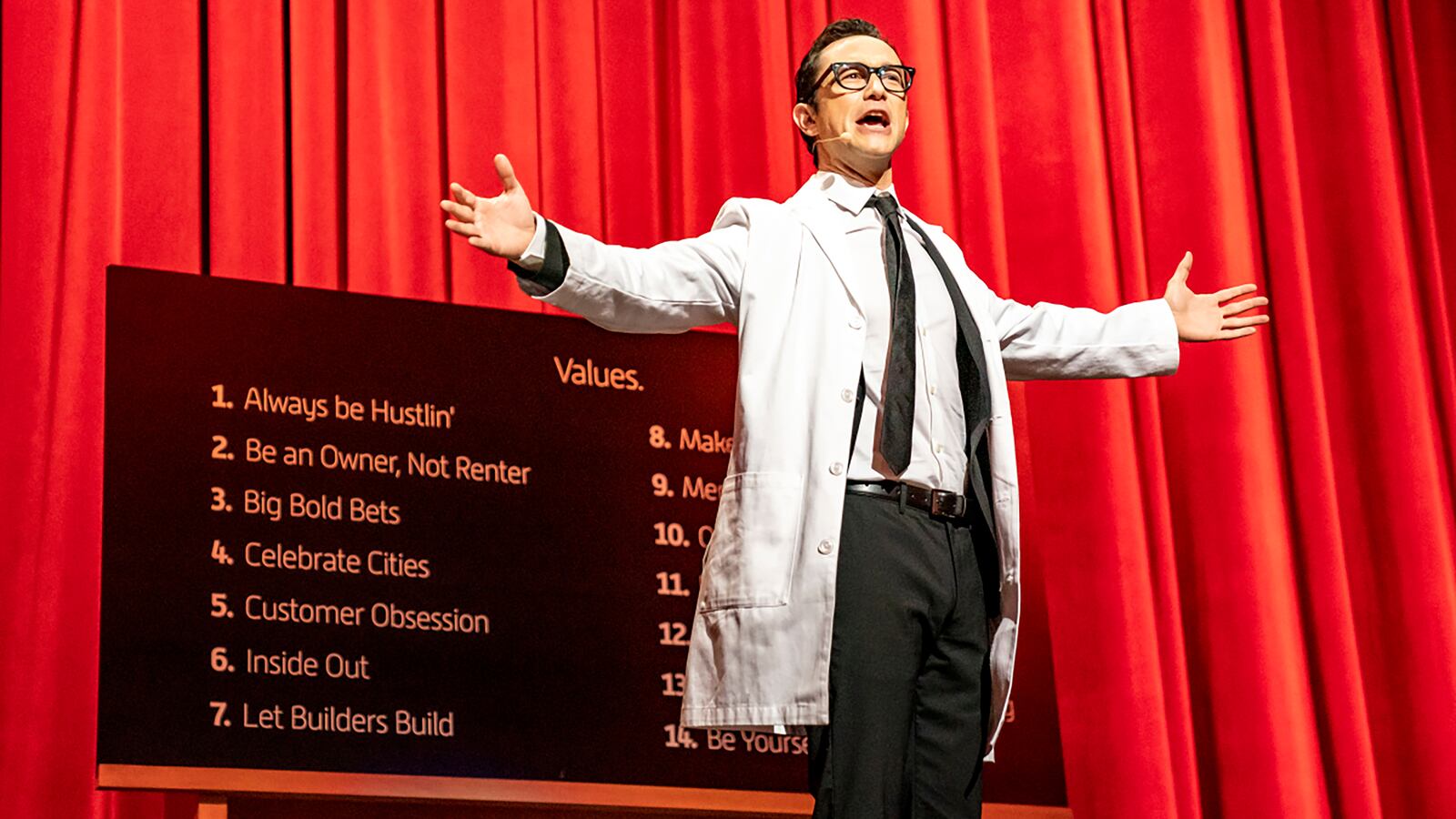Travis Kalanick is not Mark Zuckerberg, Jeff Bezos or Elon Musk, and that’s confirmed by the fact that the average American likely doesn’t know his name. Nonetheless, the co-founder and former CEO of Uber certainly fancied himself as a similar paradigm-shifting “disruptor,” and his desire to transform the world—and make himself a veritable “God”—is the subject of Super Pumped: The Battle for Uber, an eight-part Showtime drama (Feb. 27) about Kalanick’s efforts to launch and grow the ride-sharing service, and his eventual downfall due to a litany of sexual harassment complaints, and accusations that he ignored them while fostering a corporate culture of bro-ish sexism and ruthlessness. Adapted from New York Times journalist Mike Isaac’s book of the same name, it’s a damning indictment of Silicon Valley douchebaggery—even though it also feels straightforward and familiar.
The maiden installment in a planned anthology from Billions’ Brian Koppelman and David Levien, Super Pumped: The Battle for Uber’s title refers to the gung-ho ethos espoused by Kalanick, a California upstart who hit pay dirt by teaming with Canadian entrepreneur Garrett Camp on Uber, the now-ubiquitous service that allows people to call for cars quickly and easily via a smartphone app. Showtime’s miniseries aims to echo the hyper-masculine spirit of Kalanick and Uber by indulging in all manner of cutesy graphics, tongue-in-cheek green-screen reveals, alternative rock songs (if you don’t love Pearl Jam, this is not the small-screen venture for you) and narration by Quentin Tarantino that vainly strives for brashness with every tiresome “motherfucker.” Nonetheless, despite these formal stunts, there’s something rather tame about the proceedings, which take a largely chronological and uncomplicated look at Kalanick’s rollercoaster trajectory with Uber. For all the energy it expends on wannabe-revolutionary flash and sizzle, it’s never more than moderately pumped at best.
Joseph Gordon-Levitt, however, can’t be blamed for that shortcoming. As Kalanick, the 41-year-old actor evokes the man’s adrenalized ambition and arrogance, which was titanic from the get-go, when he first sought venture capital funding for his fledgling business. With a shit-eating grin routinely plastered on his smug face, Gordon-Levitt’s Kalanick is a little man with a non-stop engine, convinced at every turn that Uber (originally called Ubercar) will transform the very fabric of modern society with him behind the wheel. He’s the embodiment of unfettered greed and ego, and in tune with Kalanick’s own beliefs, Super Pumped: The Battle for Uber makes the case that those qualities are precisely what separate the greats from the also-rans—a notion borne out by the fact that Kalanick’s self-confidence and cutthroat conduct result in amazing triumphs, including against San Francisco’s transportation chief Randall Pearson (Richard Schiff), who couldn’t stop Uber from seizing control of a market previously dominated by traditional cabs.
No matter Kalanick’s global aims, Uber was dead in the water without significant VC funding, and Super Pumped: The Battle for Uber pivots around the CEO’s relationship with his financial benefactor Bill Gurley (Kyle Chandler), a former Division I basketball star-turned-Benchmark bigwig who sees in Kalanick a dreamer with the right mixture of intelligence, hunger and cold-bloodedness to make Uber a sensation. What begins as a happy marriage, though, eventually curdles, as Uber’s stratospheric ascension coincides with Kalanick’s increasingly roguish behavior, propelled by his conviction that he’s always right, can always close a deal, and is a rebellious insurgent whose every action should—and will—upset the powers-that-be.
Gurley immediately deduces that Kalanick is an iconoclast who won’t be easily reined in, but at least at the outset of Super Pumped: The Battle for Uber (whose initial five episodes were provided to press), they establish a workable rapport that boosts Uber’s fortunes first in San Francisco, and then around the country. At the same time, Koppelman and Levien’s series details the heady lifestyle embraced by Kalanick, who swiftly dumps girlfriend Angie (Peacemaker’s Annie Chang) in favor of violinist Gabi Holzwarth (Bridgett Gao-Hollitt), and who partakes in all manner of hedonistic craziness at his infamous “Jam Pad” flat. Still, there’s little over-the-top verve to this recounting of Kalanick’s journey, which posits its subject less as a wild-child genius destined to be doomed by his unique excesses than as a somewhat typical Silicon Valley creep with a brilliant idea (which, apparently, was originally Camp’s) and an ambition that was a blessing and a curse.
Kalanick’s relationship with his mother (Elisabeth Shue), who died in a boating accident in 2017, and his budding partnership with Arianna Huffington (Uma Thurman), who took him under his wing, both factor into Super Pumped: The Battle for Uber. Yet the figure that emerges is a stock tech-industry narcissist who thinks that his shit doesn’t stink, and rubs everyone’s nose in his supposed stench-free greatness. No matter the enthusiastic ugliness of Gordon-Levitt’s performance, Kalanick isn’t especially deep or idiosyncratic; on the contrary, he comes across as a cookie-cutter striver. Compared with Jesse Eisenberg’s portrayal of Zuckerberg in The Social Network, he’s a two-dimensional impresario, and as a result, most of his tale proves monotonous—a state of affairs exacerbated by aesthetic gimmickry that only sporadically juices up the momentum.
In its fifth episode, Super Pumped: The Battle for Uber stages a showdown between Kalanick and Apple CEO Tim Cook (Hank Azaria) over Uber’s privacy-violating app, and recounts the nightmare stories of two employees, one a female engineer who suffers horribly courtesy of Uber’s misogynistic workplace environment, and the other an immigrant driver who’s compelled to work long hours just to make ends meet—and is then personally berated by Kalanick himself. Those narratives afford a fuller picture of Uber’s gross attitude toward women and non-corporate employees, and of Kalanick’s callous disregard for anything—humans, morality, decency—that might stand in the way of his ultimate goals. What they don’t do, however, is expose anything that we haven’t already gleaned about Kalanick and his business, whose horridness have by this point been firmly established.
Given its contention that he’s an unlikable, media-unsavvy jerk who rode roughshod over everyone and anyone in his pursuit of his aspirations, Kalanick will no doubt despise Super Pumped: The Battle for Uber. It may also convince some to switch to Lyft for their transportation needs—even if, in the final tally, it doesn’t tell us anything particularly revelatory about the man behind our current ride-sharing reality.






